Introduction
Whether you’re a small business owner, marketing manager, or marketing director, you know how important social media can be for your business. It’s one of the most direct ways you can communicate with your clients, customers, partners, and even employees. But what is social media marketing? And how can you leverage social media marketing in your business? We’ll tackle some of your questions below and show you how to integrate the right social media platforms into your marketing strategy.
In this guide, we’re going to cover the ins and outs of social media marketing for businesses, asking questions like “what is it”, “why use it”, and “how to use it effectively”. We’ll also outline the basics of social media marketing in the business world, a few best practices, and what trends you can expect to see in the future. Like all marketing, you have to ask “what’s the goal or purpose”? Social media is no different. What are you trying to achieve with your social marketing? Answering this first question will provide direction in your social marketing strategy and dictate what channels are best for your business.
Before we jump into the deep end (don’t worry, it’s not that deep), let’s take a peek at some of the benefits of social media marketing for businesses. Obviously every business is going to have different goals and priorities. One quick exercise is to identify what benefits apply to your business.
Benefits of Social Media Marketing for Businesses:
- Increase brand visibility
- Develop relationship with customers
- Establish thought leadership within your industry
- Direct traffic to your website
There is no question that social media is booming and in order to stay relevant in today’s world, you must have a social media presence that is both strong and consistent. Social media can be an incredibly powerful tool to increase brand visibility. Brand visibility simply means your brand becomes visible by being shared, read, or seen on social media. Naturally, this will increase your number of inbound leads and organically grow your business. Something all business owners want, right?
Good brand visibility also encourages the customer to further research your product and its attributes, ultimately leading to more sales. When your product piques a customer’s interest, you have an opportunity to develop a relationship with them by answering questions they may have, providing support, and communicating with them about your product. Many times, customers will also provide valuable feedback about how to improve your product for the future. As such, keeping an open line of communication for them to contact you easily on social media, whether through direct messages and comments, is key. This one-on-one connection proves useful in many ways.

Establishing thought leadership within your industry is one way to set yourself apart from your competition. The Next Scoop supports this approach by saying, “As an industry thought-leader, you can use social media to position yourself as the go-to person in your niche for tips and advice. Whether you use a platform such as YouTube, Twitter, LinkedIn or even your onsite blog, you’ll gradually build a following of loyal users; all relevant to your industry.” In order to identify your niche, capitalize on what makes you different from other thought leaders within your field of expertise and produce content related to this for your target audience.
Another massive benefit of your business being on social media is driving traffic back to your website or blog. According to Text Request, social media drives 31% of all referral traffic. If a piece of content on social media interests someone and you provide a link to more related content on your site, chances are that person will click to find out more and increase traffic to your website. Additionally, if you work hard on your blog, it’s important for people to see it! By promoting your blog content, you will increase your leads and brand visibility by providing your customers with a more in-depth look into your business. Pro tip: Make sure there is a link to your website’s homepage on all of your social media profiles.
What is Social Media Marketing?
In a nutshell, Social Media Marketing (SMM) is when we utilize social media strategies and activities specifically for marketing purposes. More simply, it is also a way for businesses to interact with their target markets over the internet. Wordstream defines it well when they say, “Social media marketing (SMM) is a form of digital marketing that involves creating and sharing content on social media networks in order to achieve your marketing and branding goals.”
What SMM looks like in the real world varies drastically from business to business depending on their goals. Social media marketing also refers to the process of gaining attention and traffic through social media sites. Ultimately, it serves as any touch point with your consumer through a social media channel.
Why use Social Media?
Before we talk about the benefits of using social media, it’s important to address the potential downfalls. It’s crucial that you are able to post and manage consistently. Social media can damage a business if it’s not regulated. Comments and messages left unanswered = not good. But the upside is huge if you can run effective social media campaigns. Below are a few outcomes:
- Increased Brand Awareness
- More Inbound Traffic
- Improved Search Engine Rankings
- Higher Conversion Rates
- Better Customer Satisfaction
- Improved Brand Loyalty
- More Brand Authority
- Cost-Effective
- Gain Marketplace Insights
- Thought Leadership
Social Media Channels
Alright, now it’s time to get into the nitty gritty. We’ll discuss the different social channels and what they’re best for. Quick tip: don’t sign up for all of them! Pick the top 2-3 that would work for your goals and do them well. Much better to do even 1 well than 5 poorly.
Here are some quick tips to help you choose which social media channels to use:
- High number of users
- Specific targeted posts
- Important to engage through comments/messages here
- Good if you want to reach B2C customers or a slightly older demographic
- High number of users
- Mostly looking for quick updates (as characters are limited), and news
- Can use hashtags very effectively
- Good for targeting tech professionals
- Fastest growing
- Targeting through influencers/hashtags
- Great local marketing tool
- Good if going after younger demographic or have a visual product/service
- Great for business professionals (B2B)
- Successful recruiting, scouting
- Networking tool
- Food/fashion/home based
- Good backlinks to your website
- Better for female audience
Tools & Platforms
With the skyrocketing popularity of social media comes an abundance of social tools to help you stay in front of your audience. There are some great (and not so great) tools out there and speaking from experience, below are a few that we’ve used and recommend.
Sprout Social
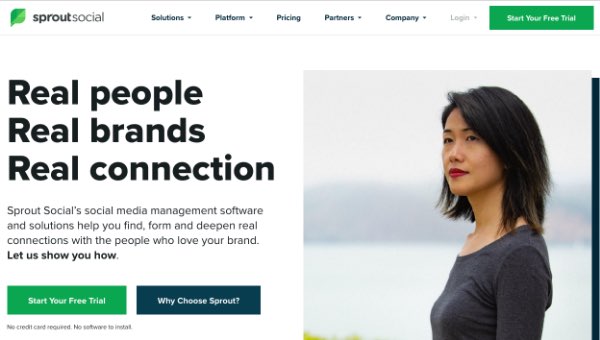
Sprout Social is one of the most popular platforms on the market. They specialize in social analytics, social engagement, social publishing, social listening – among other great features. We highly recommend Sprout Social if you’re serious about managing and growing your social media presence.
Buffer
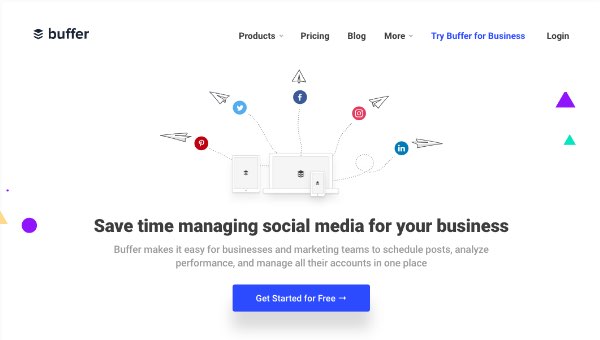
Buffer is a very powerful social media scheduling, content creation, and analytics platform. It also specializes in managing multiple social media accounts and platforms with deep integration tools. We use Buffer for our own business and love it.
Hootsuite
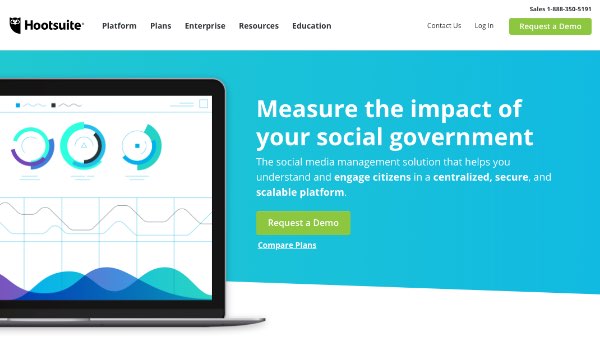
Hootsuite is one of the first social media tools to hit the market. They’ve been around for a while and gained a ton of traction. They specialize in helping you understand and engage your audience in a centralized, secure, and scalable platform. Their platform helps you find, schedule, manage, and report on social media.
Best Practices
When it comes to industry best practices, there are a few common “rules” to follow. Above all, it’s important to understand that social media, in many cases, is the face of your business. What you post, how you post it, and how you interact with people is important to consider.
- Audience – Know your theme, intention, and audience and maintain this with your text, visuals and all other content. But, also be willing to branch out and keep your content both fresh and original. It’s never a bad idea to keep your audience salivating for what’s next.
- Authenticity – Have an authentic brand voice across all mediums, especially one that is unmistakably you. Look after it with care. People respond to quality and originality.
- Multi-Platform – Utilize more than one platform by leveraging your content. This is key in ensuring your content reaches as many people as possible.
- Interact – Interact with people! This is crucial to maintaining your image and brand. People always want to know you care about how they are responding to your product and presentation.
- Consistency – Consistency is key as much with social media platforms as it is with anything else. Posting for the sake of posting is a huge no-no. Consistent yet quality content will earn you a loyal following and rewarding client base.
Measuring Success
How you measure success all depends on your social media goals. Are you trying to grow your brand? What about trying to engage new audiences? Are you trying to engage with an existing audience? Whatever you are trying to achieve, it’s important to measure your success. Here are a few metrics that you can track and a look into how to access some of these measurements on Instagram.
- Followers
- Likes / Comments
- Profile Views
- Reach
- Impressions
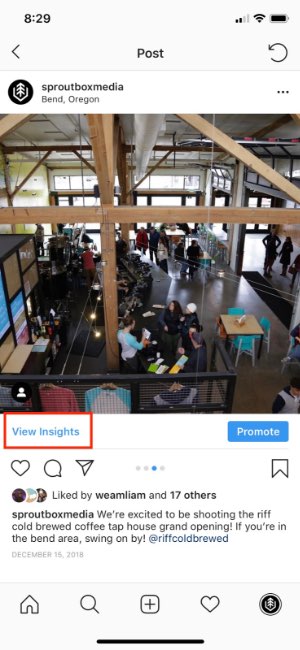
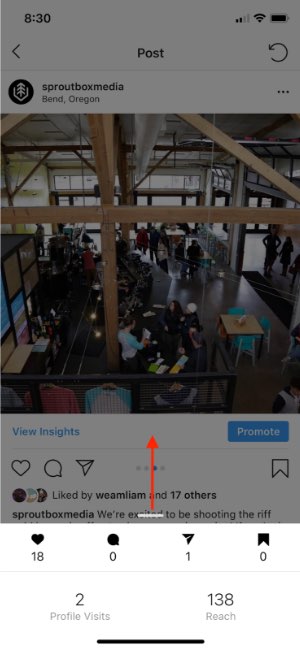
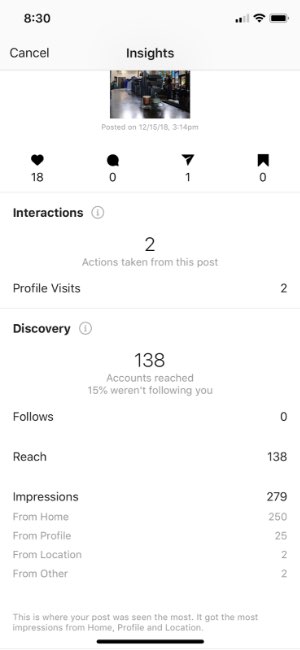
The Future of Social Media (trends)
As social media grows and changes, it’s important to understand what’s changing, how it’s changing, and where the industry is headed. Below are a few social media trends to monitor over the coming months and years.
- Visual – Users are demanding more and more visual content. Twitter was all the rave with their character limit when they first launched. Today, Instagram is hugely popular with their photo-centric approach. According to Social Report, “Visual content is 40 times more likely to get shared on social media than any other content.” We expect social media to become more visual and more engaging as technology continues to advance.
- Organic Reach – As it becomes easier and more affordable to boost promotions and ads, we expect organic reach to continue its decline. Although, that doesn’t mean it’s less effective. We expect a divergence in organic and paid reach as the two compete again each other on various platforms.
- Premium Accounts – As users continue to flood and saturate social media platforms, we expect to see companies start to offer premium, ad-free accounts. It’s a natural progression but it will be interesting to see how users adopt or reject this offering.
Conclusion
In conclusion, social media marketing for businesses can be a very useful and effective part of the overall marketing plan. It’s important to outline your goals, engage with your audience, select the right channels and tools, create visual content, and track your success. If you’re going to tackle social media marketing for your business, you must dedicate resources and budget to be effective.
Ready to get started? Here are next steps:
- Outline a social media plan with goals
- Select the right channels
- Be consistent in your posting
- Create visual content
- Engage with your users
- Track your success
Sources:
https://mayecreate.com/blog/6-reasons-your-business-needs-social-media/
https://www.wordstream.com/social-media-marketing
https://www.socialreport.com/insights/article/115005500563-3-Predictions-On-The-Future-of-Social-Media-by-Experts
https://www.entrepreneur.com/article/293454
https://www.socialmediatoday.com/news/10-benefits-of-social-media-for-all-businesses/528236/
https://thenextscoop.com/industry-thought-leader-using-social-media/amp/
https://www.textrequest.com/blog/drive-website-traffic-through-social-media/
https://www.thebalancesmb.com/social-media-marketing-definition-2948527
